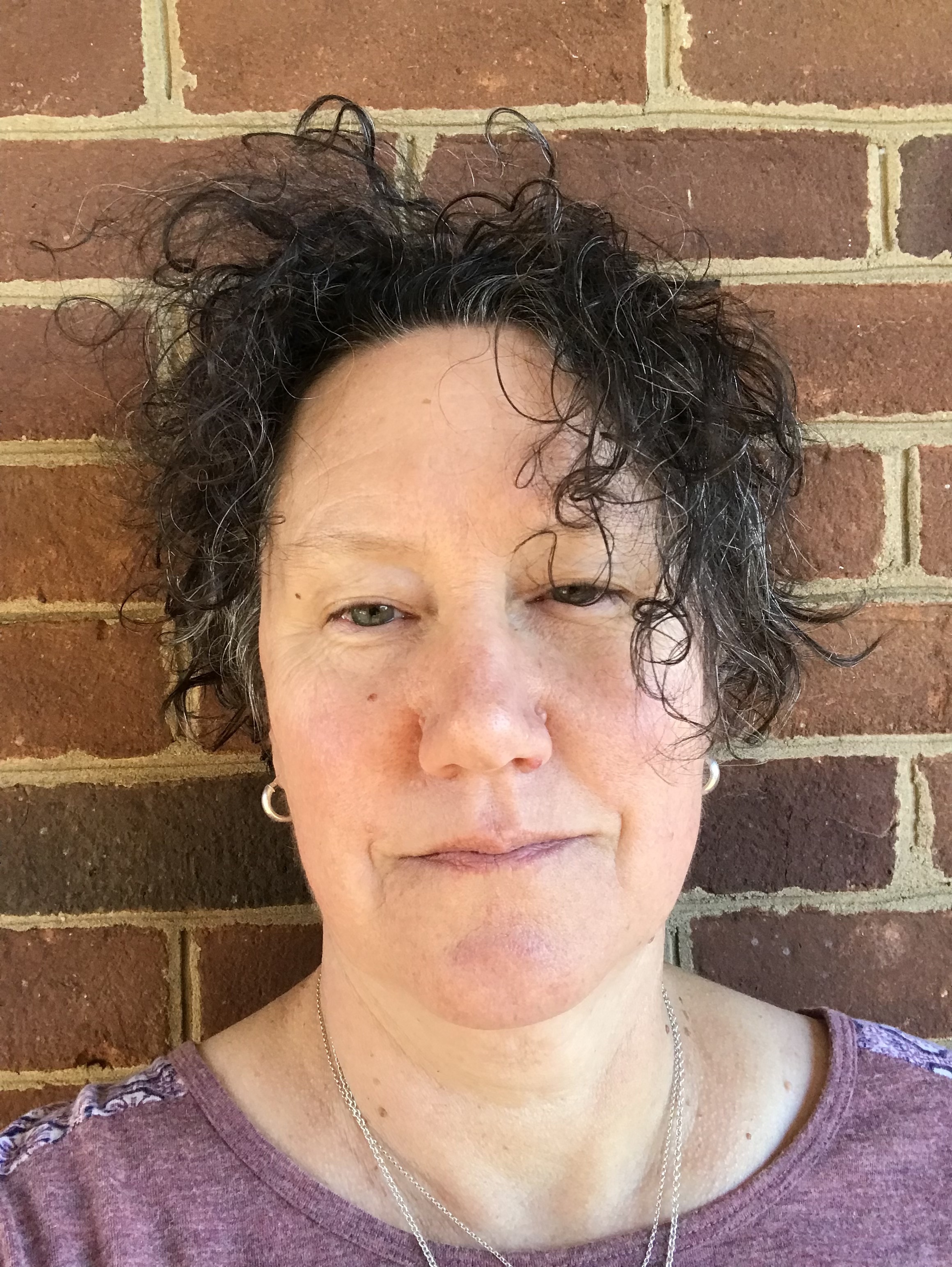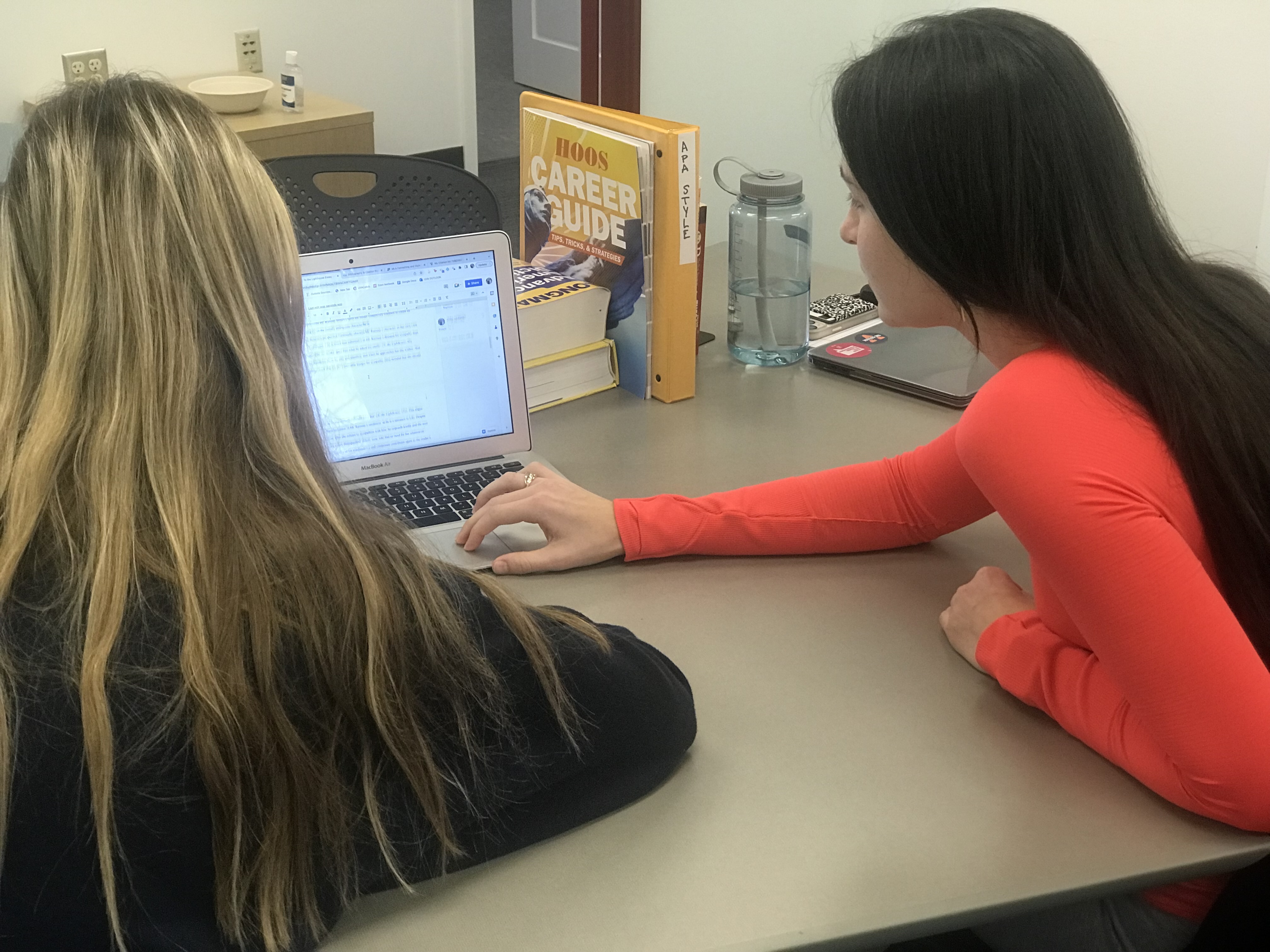Inquire Within: Talking about Writing in the UVA Writing Center

Assistant Professor Claire Chantell is on the faculty of the University of Virginia Writing and Rhetoric Program. She has been involved with the Writing Center since 2018 and serves as co-director of the Center.
The sunny, open space buzzes with conversations. “So, what did you bring to work on today?” asks one Writing Consultant, a 2nd-year Ph.D. candidate in Religious Studies. The frazzled undergrad slides her open laptop across the table to rest between the two of them, and before long they are talking, back and forth, about the student’s draft of an essay for her WGS class. In a quieter corner of the room, another consultant—this one a 4th-year double major in French and Statistics—puts on headphones to conduct an online consultation with a student isolating after a Covid exposure.
Until you step into one of UVA’s Writing Center sites, you might be forgiven for embracing one of the stereotypes that unfortunately dog writing centers across academe—that this is the place where “bad” writers slink in, shame-facedly, to receive remedial instruction. Spending just an hour at the Writing Center demonstrates that nothing could be further from the truth. As I like to tell students when I visit classes to promote our services, the Writing Center is simply a place where writers go to talk to other writers about their writing.

As all practiced scholars know, our writing always takes place within the context of conversation and consultation with others—with the members of writing groups, with thesis directors, with colleagues at conferences. Because many undergraduates and some graduate students have not yet formed these specialized communities and connections, the Writing Center offers an opportunity for supportive one-on-one dialogue with a trained, experienced peer about the content and form of a piece of writing. ESL specialists from the Center for American English Language and Culture also work in the Center, providing specialized additional support for issues related to English language grammar and usage.
Consultant Sydney Anderson, a 4th-year student majoring in Psychology and Cognitive Science, loves her work in the Writing Center “because you get to help students create something they are proud of. I provide some insight and scaffolding, but the argument, ideas, and words are all theirs. It’s fulfilling to push students to feel satisfaction in their work and a sense of pride in themselves for crafting it.”
And indeed, connection is the name of the game; very often, a client and a consultant will “click,” leading to multiple visits and a valuable relationship. Lauren Parker, an English Ph.D. candidate in her third year of working at the Writing Center says, “It’s extremely gratifying to hear at the end of a long session that I’ve been able to help someone gain more confidence in approaching a particular assignment, and even more so to see that same person come back multiple times throughout their academic career and witness their growth as a writer and student with my own eyes.” Consultants love nothing more than hearing back from a client—“Thanks for your advice on my personal statement, I got the scholarship!”

Students and faculty are sometimes surprised to hear the mantra that all Writing Center consultants learn early in their preparation for this job: focus on the writer, not the writing. “But the writing is what I need help with,” thinks the student; “but this piece of writing needs improvement,” thinks the professor. As students and teachers ourselves, we understand that perspective—we all want our writing to be judged well. But scholarship in the field of writing studies has established that these interactions are, at their best, pedagogical. While addressing the piece of writing before them, consultants keep one eye on the student as a writer, one who will write more in the future. Joe Spaziani, a graduate student, states that “the consultants are experts at writing and are able to help me see things in my writing that I simply have not been able to see … also, the consultants that I have worked with are great at reading for content and style and at giving feedback. This feedback on my writing has been critical because I am able to get an accurate picture of what is coming through to the reader from my writing.”

To meet students wherever they are (as much as possible), the Writing Center operates out of three physical locations: at 314 Bryan Hall, in the Georges Student Center on the 2nd floor of Clemons Library, and in JPJ’s Academic Center, where student-athletes can meet with consultants during study hall hours. During the pandemic shutdown of 2020-21, the Writing Center operated entirely online, offering the same services to students on the Grounds and at their homes; online consultations continue to be available for students who need that option.
UVA students at all levels and from all disciplines find support through focused, productive talk about their writing-in-progress at the Writing Center. In the words of Wendy Bishop, “talk is central to what we do as writers and as humans. It is the collaborative activity that underlies most, if not all, individual acts of composing.” “Writing From the Tips of our Tongues: Writers, Tutors, and Talk.” Writing Center Journal 14.1 DOI: https://doi.org/10.7771/2832-9414.1278
- Musings on National Violin Day
- Making the Promise Real: How a UN Tax Convention Can Fulfill the UNDHR’s Vision
- Having a Drink With Your Donkey: The Absurd in Antiquity
- UVA Club of Atlanta: Virtual Pilates Class
- UVA Club of Fairfield/Westchester: Cavs Care - Food Pantry Donation Drive
- UVA Club of Washington DC: December Book Club